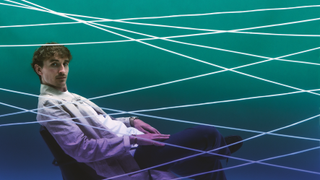While attention for his sitcom-influenced stage name has been somewhat polarising, Ross from Friends’ Felix Clary Weatherall has embraced the decision and flourished. Within a couple of years of making music, a string of EPs popularised his lo-fi house sound, leading him to be snapped up by Flying Lotus’s Brainfeeder label in 2018.
From that point, a sonic shift occurred based on the producer’s increasingly obsessive attention to detail. His debut album, Family Portrait, was the first to showcase his mind-melting take on tech house, and three years later Tread evolves his sample-based approach utilising Thresho – a software-based utility coded by Weatherall in Ableton’s Max for Live.
DJ Seinfeld also named himself after a famous TV show. Have you had similar problems being perceived through the lens of a sitcom?
“I think it gets funnier as time goes on. The bigger Ross from Friends gets, the more widespread my reputation becomes, but I definitely have days where I’m like, fuck, I’ve made a huge mistake here. But a lot of people have discovered my tunes through the show – in the early days there’d be lots of comments from people saying they’d watched clips of Friends on YouTube, Ross from Friends came up and they loved the sound.”
We’ve read you’re a big fan of Kate Bush’s Hounds of Love album. How do you think she’s fed into your creativity?
“I think it’s mainly her super-bold approach. When she came out with Wuthering Heights in the late ‘70s people were really confused but she was just being herself and I think that’s a really admirable approach. I hope to be inspired by that same level of confidence when I’m producing.
I definitely think music-making has a problem-solving aspect to it, except the solution is an abstract one and I only know what I’m looking for once it clicks
"All of her tracks are so dynamic, engaging and rich in substance, and I’m not too mad on lyrics but hers definitely add an extra layer. I herald her as much as Bowie and think her innovation is on the same level.”
Her releases are often decades apart. Is there a self-enforced pressure to release music regularly and can that be a bad thing?
“With other artists I prefer the two-year album cycle, but have come to realise that it’s hard for me to do that. My last album Family Portrait took two years just to write and it’s been the same with Tread, so I definitely struggle to create coherent projects quickly. Despite Covid being an awful time, I was lucky to have the freedom to hole myself away and work slowly on this project through 2020.”
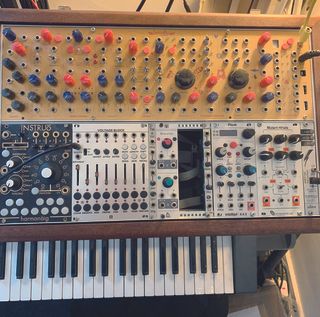
Second albums are always tricky. What was your mindset this time?
“Weirdly, I thought of Tread as my third album as I’d already released a lot of EPs and had already become well-known for a certain type of sound. Even then, I wanted to move away from a lo-fi house sound and definitely feel that I’m experimenting more and keeping a very open mind.”
You use a lot of vocal samples on your tracks. Are you bringing vocalists in or using samples from other sources?
“The only time I worked with a vocalist is when I sampled something that turned out to be a cover of a Beatles track, so I got someone in to re-sing that and wrote new lyrics because trying to get a Beatles sample cleared is about the worst thing you can do. To me, a vocal always sounds evocative regardless of the lyrical content."
When a vocal is replaced by a synth line it simply doesn’t carry that same power or human element. For me, it’s just another sound palette
“When a vocal is replaced by a synth line it simply doesn’t carry that same power or human element. For me, it’s just another sound palette, which is why I love sampling so much – it’s so digital-sounding yet there’s something nice about that being juxtaposed with a ’70s soul sample.”
The samples are also quite heavily treated. What techniques are you employing?
“I’ve got a Eurorack setup containing a bunch of modules, one of which is a really small compressor and anything you feed through that sounds amazing. There’s also a Mutable Instruments Cloud clone that I use a lot – it’s got a mad delay on it that can stretch things in a very digital way, but I also use a lot of software processing, employing techniques like comb filtering or saturation on saturation to create a destructive effect on a vocal.”
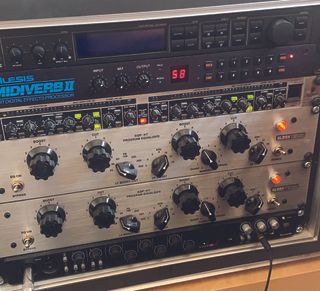
Did you specifically buy modules to use them as effects processors?
“I began using modular to make synth lines from but started buying effects modules and have delved into that more, but I like to keep a bit of both as sometimes you can throw a sample through a synth module and create some strange melodic piece. I’m into all of the mathematical functions that come with modular and like to make generative music or effects, adding randomness and other ideas that keep me occupied for hours.
"When I first use a module it’s nice not knowing what it does, but then you get to a point where you do something really good and wonder how the hell you’ll get it back, so I’ve ended up learning every module inside out.”
Do you see music-making as a problem-solving exercise and get satisfaction from that?
“I definitely think music-making has a problem-solving aspect to it, except the solution is an abstract one and I only know what I’m looking for once it clicks. When it comes to the actual writing process, it seems to be about what feels right, and that’s based on everything I’ve learnt about music throughout my entire life.
I want to make something that sounded original and forward-thinking but had that nostalgic element that’s always ingrained in me
"Sometimes I’ll write some drum patterns or a sample or melodic idea and try to jam them together, so it all starts in bits with me moving stuff around and dragging it all together. I usually spend a week on YouTube digging for samples and once I’ve got a huge bank of sounds I’ll open the software and try things out.”
What sort of things will you look to sample from in YouTube?
“I have a method for finding samples that starts with a random country name, a random genre and an era and then I look to see if there’s a playlist containing stuff that people have made that interests me. Sometimes you’ll find something mad and completely unexpected, like Ethiopian soul from the ’60s. I’m working on a mix at the moment and a lot of the content is based on obscure samples that I didn’t use for the album.”
How do you achieve that warm, saturated sound your music’s known for?
“The overall mastered sound is based on what I truly like rather than the technical decisions I make. After hours and hours, day after day of EQing and changing things, my ear will gravitate to a certain type of sound whether I’m using digital or analogue tools. After working on something for so long, hopefully I’ll end up creating a sound that’s naturally unique to me.”
Do you tend to work on ideas at home before taking them into your studio?
“I didn’t have a studio when I was making my first EPs and the first album was made on the road. Most of the tunes were completely written on the laptop with the intention of finishing them in the studio but it all got a bit messy so I ended up finishing the tracks digitally. Now, I come to the studio pretty much every day even if I’m not writing music.”
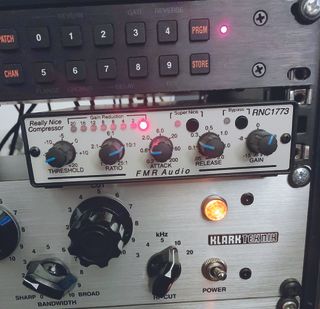
We understand that the area of London that you’ve been based in has played a role in the album’s concept?
“That was something I didn’t fully realise when I started writing the album, but because I was here so often I started thinking more and more about the good times I’d spent around the Old Kent Road, and those memories were connected to certain types of music I was listening to at the time.
"All that fed quite nicely into the album, especially when it came to a lot of the drum rhythms. I want to make something that sounded original and forward-thinking but had that nostalgic element that’s always ingrained in me.”
A good example perhaps is the track A Brand New Start, which is a mixture of classic soul/jazz and modern electronic…
“There was definitely a concept behind that track. It came from a quote based on a Red Bull Academy talk made by Madlib who said that when you’re producing music all you need to do is cut a sample from a track and let that do everything for you.
"I wanted to use that in some way so on A Brand New Start I cut two or three minutes from a track, ran it through my modular and recorded the whole thing just to keep its raw feeling. Again, that came from digging through YouTube, but unfortunately I can’t say what the sample is from on that one [laughs].”
I find that recording bits from the computer through outboard is a just a really quick way to get an analogue-sounding mix
Are you running your samples through a lot of outboard to fatten them up?
“I’ve got so much hardware, including mixing and mastering EQs and preamps that I use as effects to give the sounds a bit of crunch. At the moment I’m using Klark Teknik EQs, which are unbelievably good knock-offs of these mad, high-end Pultecs, a classic Alesis MIDIverb effects unit that all the jungle-heads used to use, a DBX compressor, and a Roland Space Echo.
"I also use a really cool spring reverb tank, which I don’t even use as a reverb - I’m usually just waggling the springs around to get noises out of it. It only cost £10 and doesn’t make sense that you can make good music using something so cheap.”
How has your increasing use of outboard affected your sound?
“I find that recording bits from the computer through outboard is a just a really quick way to get an analogue-sounding mix, especially with compression because you can really smash something and it sounds brilliant.
"Also, when you print something and record it I find that it changes the process in a really interesting way because you’re left with an audio file. That means if I want to change something I have to chop it up, and that process has definitely changed how the sound of my drums flow compared to previous tracks.”
I had an idea to create a piece of software that would record everything I play and stop when I stop so I wouldn’t have to take that conscious step to record myself all of the time
What performance hardware are you using?
“I’ve tried to keep that minimal, so I’ll only use one playable synth, one desktop synth and a drum machine because I don’t want to have too broad a sound palette. Pretty much every track uses my Prophet ’08 desktop module; although I’ve rinsed that so much I might have to sell it now. I also use a Roland TR-8S, which has all the classic 707, 808 and 909 sounds. That aside, I’m using the modular.”
The tracks are very fast-moving and complex but that’s definitely balanced by a lot of ambient sounds?
“I do think there are moments that are fairly intense and full on and I just wanted to balance that with lower, ambient moments, so the tracks have a lot of quiet breakdowns just to give people a bit of a breather. Some of the ambient sounds are early recordings of synth stuff I did on the modular, otherwise it’s mostly the Prophet ’08 module heavily affected with outboard and software.
"On the track Morning Sun In A Dusty Room I used a dub siren sound generator. It’s something I’d always wanted to buy but I found a plugin that does the same thing really well and for a few weeks I was putting it on absolutely everything.”
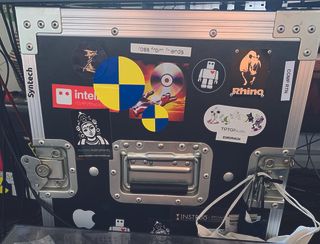
On the software side, can you tell us about the Thresho software you designed recently?
“I was getting frustrated with outboard gear because I’d play something for a track that wasn’t quite right and would end up rerecording it over and over again, or I’d sit in the studio playing keys for eight hours and have nothing to show for it. So I had an idea to create a piece of software that would record everything I play and stop when I stop so I wouldn’t have to take that conscious step to record myself all of the time.”
Was there no other pre-existing software on the market that could do this?
“The closest thing I could find was an app that records your snoring when you sleep, so I made my own software in Max/MSP linked to Ableton through Max for Live. Every time I start a new project, once the audio hits a set threshold it starts recording and when I stop playing it stops recording. Thresho then puts the sounds into a time-stamped bank of samples that you can flick through to find what you want.
I want to encourage people to do something creative, whether that’s remixing my tracks or using the content for an installation or their own music
"For the first six months of writing I was fiddling around in the studio without committing to anything and ended up building this huge bank of sounds I could drag into a project. It’s the same principle as sampling – except I’m sampling myself. It can work on multiple channels too; I’ve done jam sessions where Thresho recorded drums, modular and synths on separate channels.”
Did you code the device yourself or work with Ableton to achieve that?
“I’d done some coding at university for a computing module but had forgotten nearly all of that. Being quite logical, I just backed myself to do it – a lot of the process is about knowing what you want and Googling, but it’s all done within Max for Live.”
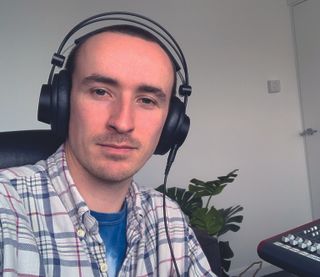
The tracks Thresho 1.0 and 1.1 highlight your use of the technology…
“Especially Thresho 1.0 because the whole track is composed of samples recorded on Thresho and I didn’t have to write anything specifically for the track. For Thresho 1.1, I bought a toy music box that you can punch a melody into and used that as the main synth line.”
We understand you have shared your Thresho content library with people so they can use it to create reinterpretations of your music?
“Originally, I was going to release it as a one thousand-track album, but I didn’t think it would be listenable so we decided to create a database of stuff that people can dig into. All the file names are time stamped, so people can look through them and see what Ross was doing on their birthday at 12pm or what I was playing or writing at any exact moment, a bit like a diary.
"I want to encourage people to do something creative, whether that’s remixing my tracks or using the content for an installation or their own music."
Ross From Friends' Tread is out now on Brainfeeder Records.
Visit Ross From Friends' website to download the Thresho plugin and browse his sample database.
